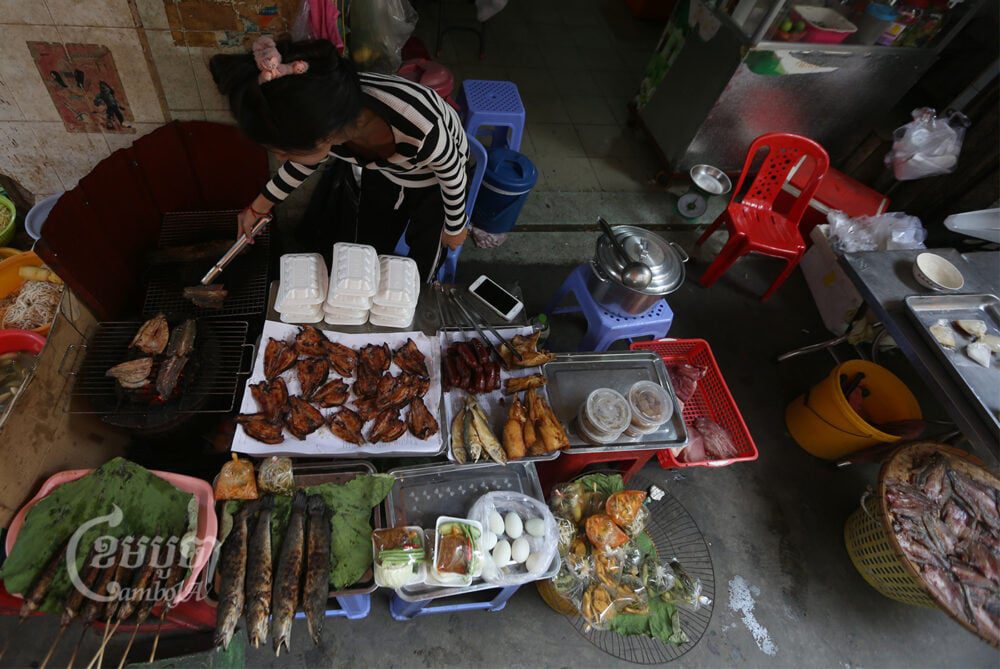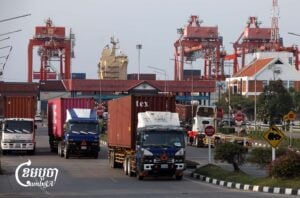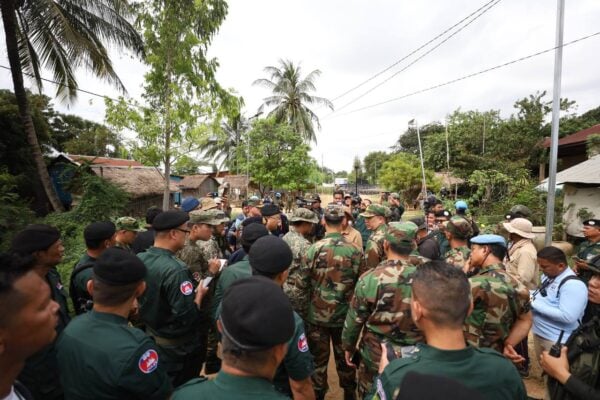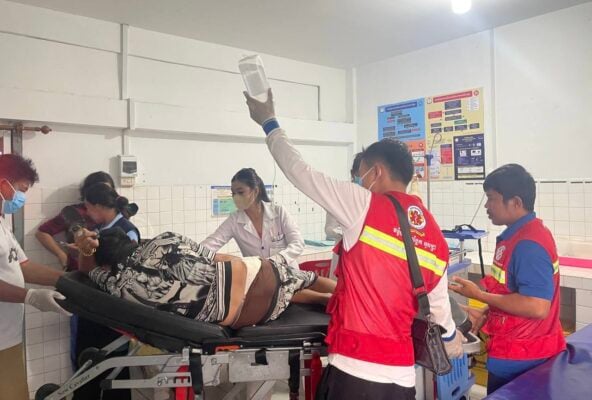Listen to the audio version of this article (generated by AI).
Street vendors have appealed for equal social protections as climate change, unstable income, and lack of proper places to trade continue to threaten their livelihoods, even as Cambodia moves toward a green, digital economy.
The vendors highlighted challenges and spoke about the efforts to improve labor standards and welfare at a forum marking the 13th International Street Vendors Day, themed Social Protection for a Just Transition, Environment and Digital Context.
According to Oxfam Cambodia, the global street vendor market is projected to grow to $4.73 billion by 2029 from $2.68 billion in 2024, driven by innovation and consumer demand. Yet, behind these figures lie a sobering reality: more than 60% of the global labor force operates in the informal sector, often without access to adequate social support, it said.
According to 2021 data from Cambodia’s National Institute of Statistics, 49% of workers were self-employed, including street vendors, while 36% were classified as employees and 15% as unpaid family workers.
Sam Sreynak, 30, who has been selling beverages on several streets in Phnom Penh for nearly a decade, said street vendors want equal protection and support as they struggle with irregular income, climate impacts, no fixed selling locations, and rising costs.
“We face many challenges, such as having to sell on public roads and near people’s homes. Sometimes the authorities chase us from the streets,” she said.
Sreynak said creating designated areas for vendors would benefit workers and the state, as informal businesses also contribute to the economy. She welcomed the support of the National Social Security Fund (NSSF) but hopes to see stronger assistance.
“I want the government and relevant partners to help us more, as prices [inflation] are too high, it’s hard to make a profit. A suitable location should be prepared for us to sell too,” she said.
Street vendors support their family livelihood and the national economy, Oxfam said, so they are entitled to the same rights as other workers, including equitable access to social protection and welfare systems. Health insurance, childcare, maternal protection, education, hygiene and safety at workplaces, and access to financial services, are also essential and must be prioritized.
The situation is more pronounced in Cambodia. According to the National Institute of Statistics (2021), 88.3% of workers are engaged in the informal economy, with street vending serving as a primary livelihood for many.

Another Phnom Penh-based street vendor, Kop Karimas, said informal workers are faced with technological problems, so they are not able to register for NSSF on their own yet. Therefore, they cannot use the service when they are ill.
In addition, she urged the government to consider offering reasonable rental rates for informal economy workers to trade with ease.
“We should receive the same benefits as those who work in the system. One is health care, which is not enough, and we don’t benefit from other things. We also ask for clean water to reduce expenses, because when it’s hot, it’s very hot, and it floods when it rains,” Karimas said.
Heng Sour, Minister of Labor, said climate change has become a challenge for street vendors, but at the same time, changing lifestyles and work habits also require street vendors to adapt to a more flexible lifestyle. Although some people face difficulties, these have eased compared to previous years, he remarked.
He urged the vendors to take advantage of the government’s 1.5 million vocational and technical training programs and opportunities to study to gain additional skills to meet social needs. Street vendors are also asked to register so that the government can help them effectively.
“I will work with Oxfam and other ministries to see how we can help street vendors once we register them. I will instruct all 37 schools to provide short online courses that are important for everyone. The support provided by the National Council for Social Protection is based on the principles of equity and equality,” said Heng Sour.
Vorn Pao, president of Independent Democracy of Informal Economic Association (IDEA), said while there is no official number of street vendors in the country, they drive the economy and are a source of employment, as they contribute to tourism and offer meal options for the middle and low-income groups.
He said recent policy developments, including the Digital Social Protection System and expansion of voluntary health care contributions for self-employed workers are forward-looking efforts.
However, many street vendors are excluded from formal protection, according to Oxfam and IDEA which call for a more inclusive approach that ensures social protection schemes are accessible, effectively implemented, and responsive to the realities of informal workers.
Pao said vendors still spend a lot of money on rent to site owners, security and informal payments. They also face issues like lack of clean bathrooms, insufficient water and electricity to meet their needs, as well as climate change and digital literacy to access social security services.
As such, the government and institutions should look at providing suitable places to sell, including night markets and footpaths in tourist areas, and take into account the problems of water, electricity, and sanitation.
Phean Sophoan, Oxfam national director, said street vendors should be acknowledged as key contributors to Cambodia’s development.
“They are the backbone of Cambodia’s informal economy. They work long hours in difficult conditions to provide food, and [sell] goods and services that sustain our community,” said Sophoan.
While they remain among the most vulnerable and least protected, she said, “we must ensure that social protection systems are designed to include them not as an afterthought, but as a priority”.
Meanwhile, a report by Street Net International revealed that street food vendors in Cambodia, Laos and Vietnam are increasingly threatened by extreme weather. In Cambodia, rising temperatures and frequent floods especially affect women vendors, who often balance work with caregiving.
Despite this, vendors receive little targeted support, the group said, calling for coordinated measures, such as formalization, better infrastructure, financial assistance, and gender-responsive policies to help vendors stay resilient and protect their livelihoods.











